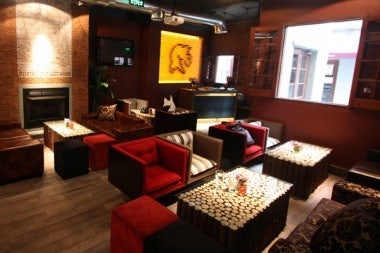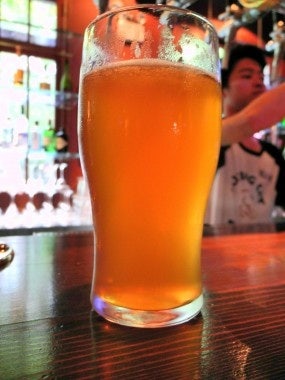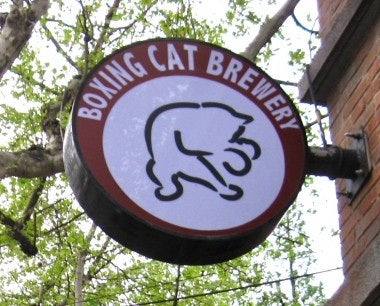Interview With Lee Tseng And Michael Jordan Of Shanghai's Boxing Cat Brewery#

Though its first modern brewery opened as early as 1903, until recent years beer culture in China started and ended with cheap, German-style light lagers. However, in the same way the tastes of many Chinese wine drinkers have progressed from inexpensive domestic plonk to high-priced imports, beer drinkers in China are becoming more receptive to the craft beer movement that has swept through North America and Europe over the last 30 years. With premium beer gaining a stronger foothold in cities like Shanghai and Beijing, domestic Chinese beer brands have even gotten in on the game, with Tsingtao launching its "Augerta" and "Yipin Pure" lines and Zhujiang taking a stab at Belgian-style witbier with "Supra White Beer." Microbreweries, though, have until recently been largely absent from the China market, in stark contrast to Japan and Singapore.
But this, like everything in China, is changing quickly. Founded in 2008, Shanghai's
Boxing Cat Brewery#
is at the forefront of the Chinese craft beer scene, along with newer microbreweries like Beijing's Great Leap Brewing and Slow Boat Brewery. To get a better sense of where China's beer movement is and where it could be heading, Jing Daily recently sat down for a chat with Boxing Cat co-founder Lee Tseng and brewmaster Michael Jordan at the brewery's Sinan Mansions location.
Jing Daily (JD): Can you say a little bit about the concept behind Boxing Cat Brewery?#
Lee Tseng (LT)#
: The first Boxing Cat Brewery opened in April 2008. The main concept behind the Boxing Cat is we wanted to really introduce craft beer, which was at that time almost nonexistent, to the Chinese market. The country itself was, and still is, more entrenched in German beer culture than any other culture. Over the past three years, since we started, a movement has started in a sense, as we've brought in craft beer culture and more premium beer importers, mostly Belgian, have come here.

JD: What encouraging signs have you seen in the market since 2008, if any?#
LT#
: Locals have started to take a notice in beers aside from the usual mass-produced products. I think a testament to how far the industry has come along can be seen in a couple of areas. Since we opened, two other microbreweries have popped up in Shanghai, doing the same kind of thing we're doing, and more tellingly, one belongs to a major hotel group, the Kerry Group. They're the parent company of Shangri-La Hotels. And I say that's a telling sign because the Kerry Group tends to replicate a lot of their F&B creations. So for them to feel that they want to do this concept, obviously it's something they feel has a lot of promise.
The other telling thing is that Belgian beer offerings have done pretty well here in China. Not only do you see more places like Kaiba opening its third location recently, you see lots of restaurants starting to carry American craft brews or European craft brews, even at local restaurants. That's one of the most encouraging things, when you have a restaurant like Di Shui Dong serving Hunan food and they have five or six craft beer offerings in bottles. All these things lead us to believe that if we keep doing the right thing, this could be something fruitful for all of us.
JD: How does your team break down?#
LT#
: Mike is the brewmaster, and he joined our team after the passing of our original brewmaster and co-founding partner [Gary Heyne]. Basically, we let Mike do all the things he's good at, so for Mike that's everything connected to beer. Whether it's brewing it and deciding the direction of expansion in terms of equipment and ingredients, we let him have full control of that. I work more in business development and direction, so hopefully I'm the guy who will make sure we're on everybody's minds, not only in Shanghai but throughout China. And my partner, Kelley [Lee], the other co-founder, is a pretty prolific restauranteur in China. She loves doing concept design, and we collaborate a lot on the BD and operations side.
JD: You mentioned that even Hunan or Sichuan restaurants here are increasingly stocking premium or craft beers. In terms of beer education, what do you feel is clicking here among local drinkers?#
Michael Jordan (MJ)#
: Our best-selling beers are still the lightest beers, the Pilsner and the Helles. We sell quite a bit of the IPAs as well, so that's on people's radar. But we're pretty experimental with our beer styles, not only because it's fun, but as a way to educate our staff and our customers about what beer can be and how all these different beers can go with different kinds of food.
LT#
: Just to add to that, we're doing certain things to further [develop] people's palates, like our first official Brewmaster's Event, where we pair dishes off our menu with the beers we offer. Really the purpose of that event is to help people think of premium beer the way they think of wine, rather than the way it's typically presented in local culture. That's to say you want to drink as much beer as you possibly can and 'ganbei' as smoothly as you can. The local drinking culture is, you'd rather have nine empty bombers sitting in front of you to show off how much you can drink, and have small glasses each time to kill it as fast as possible and pour another. It's an ego thing. And we want to show locals that there's more to beer than that.
MJ#
: And that there's more flavor in beer than that.
LT#
: It's something that can be enjoyed, rather than just a tool (laughs).
JD: In terms of customer breakdown, do you find your customers are more expats, or are there a good number of locals who come by here regularly?#
LT#
: I'd say it depends on your definition of expats. In the general definition, which is everybody from outside of China, I'd say, including other Asian countries, it's probably right now about 85/15. But if you broke it down a little bit further, Asian countries versus non-Asian countries, I think that number would be more like 70/30. And if you were to further break it down, Asian faces that maybe have spent time abroad or growing up, it might break down to 60/40 Asian versus non-Asian faces.
MJ#
: It's really hard to break down.
LT#
: Yeah. We're in this market for the local Chinese. That's what we're aiming to do. I think initially we know beer better as an expat product and that's how we packaged it. But moving forward with the brewery, I think we'll try to introduce things that are more local-friendly. And that's pretty logical, I think, in the sense that we're in China and there's no point in being among the world's largest population just to cater to the expats.

JD: Japan has a thriving craft beer movement, and Japanese craft beer like Hitachino can now even be found in the US. I'm curious how you see yourselves fitting into the idea of having a Chinese craft brewery that has the potential to go global.#
LT#
: I think we really want to be something that people know China-wise, but at the same time we don't want to be "good…for China." I hate that moniker. That's why there's been more of an effort, and will be in coming years, to do national competitions, to have more exposure. Mike's been a big part of pushing some of these initiatives, like this year we took part in the Australian International Beer Festival, and won two medals there. Mike was just invited to be a judge and a speaker for the Japan Craft Beer Festival. Moving forward, we'll have a bigger presence at the Singapore Beer Festival and World Beer Cup next year.
Things like this are in the pipeline, not only to continue doing what we're doing domestically, hopefully so people outside of China can also hear about us.
MJ#
: Part of the international standard for craft beer, not just on the Chinese level.
LT#
: Part of the pitch to get Mike here, was I said there are brewmasters in Singapore from the US that people know by name when you talk about craft beer in Asia. I was telling Mike, wouldn't it be great if when people think about beer in Asia, you're on that list? And more importantly, you're going to be doing it on the Chinese stage, in China, which is by far potentially bigger than any other craft beer market. That's a pretty nice goal to work towards.
JD: Going forward, what are some of your broader plans?#
LT#
: I guess our plan going forward is to continue our expansion. We're looking for a new location now, and more importantly I think we have a couple of other interesting projects in the pipeline. We definitely want to grow our name in China, particularly the beer. If you go to any bar in North America, they have at least two or three craft beers on tap apart from their regular beer offerings. In China, you don't see that. I think there's a good opportunity for us to work towards that.
JD: So to that end, is bottling something that you're thinking of going into?#
MJ#
: We currently don't do any bottling, just kegs for our own facilities, but that is a goal that we're trying to plan and move on right now. There are a few challenges, of course, but it's still a goal.
LT#
: Regulations here are a bit different, which is a challenge but also an opportunity. You can't just say, I want to open a factory, I can get a license through a set application processes. That license is almost impossible to get, but we're working on some of our leads to maybe get around these roadblocks. But having said that, I think it's the biggest roadblock currently.
JD: I know that some other cities in China, Beijing in particular, are developing some small microbreweries, almost nano-breweries. Do you find that encouraging in terms of the idea of possibly expanding into other cities, or do you feel like you'll do your thing here and let them do their thing there?#
LT#
: We definitely want to be in other cities. I think for us, strategically, we'd prefer to have a factory in place before we look at that. We're very much about brand-building right now, and we aren't too willing to get too far ahead of ourselves to sacrifice that. If a great opportunity came up for us to expand before we had a factory, we'd definitely be open to it, but at the same time we know we're not worried about not having enough to do here. There's plenty on our plates, so i'm not going to be too concerned about things that far down the line.
MJ#
: I think it's encouraging. There's Great Leap in Beijing, and Slow Boat Brewery, which is very new. I think it raises awareness all over the country.
JD: Also, you've got a lot more people here who possibly miss beer from home, or are homebrewers themselves.#
LT#
: On that note, that's something we'd like to see more interest in China towards, the homebrewing front. We're likely going to go to Nanjing for a locally organized homebrewing competition soon.
MJ#
: I know a few homebrewers in the area who often contact me for assistance in getting materials, whether it's grain or hops or even a simple airlock. I usually try to help them out the best I can because it's hard to source materials at the homebrewing level, even at the commercial level sometimes (laughs).

JD: Compared to the typical beer on the market, premium and craft beer is almost like a high-end product here. What are you going to try to communicate that, in terms of promoting your beer, to the local population?#
LT#
: We're very much trying to do it through grassroots marketing. For one thing, we make our beers with the best possible ingredients that we can get our hands on. Obviously, Mike being in China after having been in places where he never had to worry about these things has made him adjust to the limitations of the market. And second, we've got educational activities like the brewmaster's dinner and more presence at local events. As I mentioned, we want to gear ourselves towards the local market more and more. So we're trying to organize beer festivals to let people know there are great beers on a non-commercial level. The marketing side of having locations in good areas in Shanghai works out in our favor too. We're trying to open locations in premium areas because this is a premium product.
That's the great thing about Shanghai. It's a city that fashions itself as a forward city. It wants to be seen as a leading city, so a lot of people here are willing to look at new things to try. And of course, we hope for more exposure in the media explaining why certain beers are premium rather than commercial.
We're not a company with investors behind us, we're not a multinational. We're trying to grow within our means and we're hoping that'll get to a level where we can do the kinds of things that people with deep pockets can do (laughs).
Boxing Cat Brewery Stats:#
-
Production#
: 10 hectoliter brewhouse. Brews beer two to three times per week to support establishments. Will produce 800-900 hectoliters total beer this year.
-
Beers#
: Four flagship beers at all times (Helles, Pilsner, Pale Ale, IPA), plus two rotating seasonals.
-
Materials#
: Hops sourced through Hong Kong distributor. Hops roughly 80 percent American, with some European varieties. Base malts and some specialty malts are domestically produced, with most specialty malts imported from Germany. Considering building relationships with hop farmers in China to grow other varieties.
-
Observations on local palates#
: Locals enjoy beers with floral hop character -- beers with notes of passion fruit, lemon, tangerine, grapefruit. Experimenting with local ingredients such as Sichuan peppercorns, ginger, oolong tea, star anise and pear sugar.